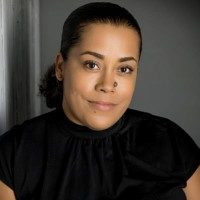You talk about a level playing field, but the ground isn’t level!
Date 3 March 2023
Drawing from her own life experiences, Naomi argues that the only way institutional change can be made is through the provision of strategies that uplift marginalised and oppressed groups.

“You need to see a physical manifestation of your dream… There is something about seeing someone who looks like you that makes it more tangible…It gives you the possibility to look through your imagination and you know what… redefine yourself.” – Viola Davis
In this quote Viola Davis talks about her experiences as a Black Women and how seeing someone who looked like her Acting in a film was a pivotal moment in her career trajectory.
The way in which we see the world and our place in it is informed significantly by representations placed before us. At the later stages of my compulsory education, I went to an all-girls school, so my experience of gender inequality was absent from this environment in relation to my peer interactions. I was however vastly aware of how different I looked to my classmates and my socio-economic status. I grew up in a household with both parents working in professional roles and never lacked for anything growing up. My parents worked extremely hard to provide me with an educational environment where I could thrive academically. In School I was frequently told, both verbally and on school reports, that I had my “head in the clouds” and did not focus enough. With large class sizes and a lack of support from teachers I struggled to engage and frequently found myself in detention. This led to my parents decision of sending me to a private school in the beginning of year 8. This was a huge push for them financially, although they did not make this apparent to me. I am extremely thankful for all the sacrifices they made for my education. In my new school I was placed in much smaller classes and, although I was not a grade A student, I thrived academically.
Representation within my school however was extremely minimal. I was one of a handful of Black and Brown girls and conscious of how different aspects of my identity, such as my hair, looked. I frequently tied my hair up in a tight bun at the back of my head, never embracing my thick curls or letting anyone see my hair down. I was extremely aware of how different I looked within that environment however I lacked confidence to share this personal struggle. I wanted to achieve results within my compulsory education that would make my parents proud. My school environment had a heavy influence on the way in which I expressed myself and my cultural identity. This impact would have been much greater, had my parents not also sent me to an Afro-Caribbean Saturday School. It is interesting how within the Saturday school environment I felt at home and free to express my identity, however in school I was withdrawn and distanced myself from peers.
There is power in representation and the lack of it can have a detrimental effect on individuals personal and career trajectories. My confidence shifted when I left the private school setting, with the grades I needed, to attend college. Within this diverse environment I thrived and was able to explore the options available to me. Upon progressing my career into working within Further and then Higher Education roles, I was able to discover where my passions lay and how important it was for me to have an impact on individuals own trajectories, in a small or big way.
In my adult life I have become hyper aware of how my gender and race informs people’s perceptions of me and my abilities. I had one experience within a workplace where my mixed-race identity provided me a privilege only when I showed allyship to white colleagues within the department. As an educator early in my career I needed mentoring and support, however my identity within the department was questioned when I moved to become more independent and form stronger relationships with my Black colleagues. It was only then that I noticed a racial divide within the department and a toxic culture in which colleagues of Black and Brown backgrounds were pushed out of the workplace, through frequent microaggressions. I became one of those individuals who left in silence in fear of the impact speaking out would have on my career.
I am in a work and research environment now in the University of Northampton and Loughborough University where I can express my identity and my voice is not silent but uplifted. I am completing my Doctoral research on the experiences of Black and Brown Women within Higher Education roles, and I am the Chair of the BAME Staff Network within Loughborough, in which we advocate for members from Black, Asian and other racialised minority groups.
There are countless narratives of women walking into rooms and feeling like they don’t belong within those spaces. Frequently these environments are dominated by White Men, with a higher proportion of them being in positions of leadership and power. It is frequently the case where representation is extremely low in senior leadership roles, especially when you look at the percentage of Black and Brown women in Vice Chancellor positions. I am not going to post the current figure of representation in the UK. I task you with the job of conducting this research.
- Can you find 1 current Black Vice Chancellor who is a Woman?
- Can you find 1 current Brown Vice Chancellor who is a Woman?
- Can you find 1 BAME Vice Chancellor who is a Woman?
This brings me back to the title of this blog post “You talk about a level playing field, but the ground isn’t level!”. The only way institutional change can be made is through the provision of strategies that uplift marginalised and oppressed groups. Policies existing alone, without consultation of the Women these reflect, is inadequate. I do not have all the answers to the how and the why, but I do plan on uplifting voices of Black and Brown Women through my research and advocacy work.
This is only a small fragment of my life story.
